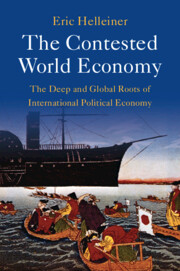Book contents
- The Contested World Economy
- The Contested World Economy
- Copyright page
- Dedication
- Contents
- Preface
- Abbreviations
- 1 Introduction and Overview
- Part I The Three Orthodoxies in a Global Context
- 2 The Rise of European Classical Economic Liberalism
- 3 Economic Liberalism from Non-European Perspectives
- 4 Neomercantilist Reactions in Europe and the United States
- 5 Neomercantilist Reactions Elsewhere
- 6 European Marxist Critiques of Global Capitalism
- 7 The Global Diffusion of Marxist Thought
- Part II Beyond the Three Orthodoxies
- Part III Ending at a Beginning
- Works Cited
- Index
5 - Neomercantilist Reactions Elsewhere
from Part I - The Three Orthodoxies in a Global Context
Published online by Cambridge University Press: 20 April 2023
- The Contested World Economy
- The Contested World Economy
- Copyright page
- Dedication
- Contents
- Preface
- Abbreviations
- 1 Introduction and Overview
- Part I The Three Orthodoxies in a Global Context
- 2 The Rise of European Classical Economic Liberalism
- 3 Economic Liberalism from Non-European Perspectives
- 4 Neomercantilist Reactions in Europe and the United States
- 5 Neomercantilist Reactions Elsewhere
- 6 European Marxist Critiques of Global Capitalism
- 7 The Global Diffusion of Marxist Thought
- Part II Beyond the Three Orthodoxies
- Part III Ending at a Beginning
- Works Cited
- Index
Summary
This chapter examines the ideas of neomercantilist thinkers from outside Europe and the United States whose thought became well known in various places during the pre-1945 period. Some of them adapted the ideas of neomercantilist thinkers from Europe and the United States in creative ways, including thinkers from Argentina (Alejandro Bunge), Australia (David Syme), China (Liang Qichao), Ethiopia (Gabrahiwot Baykadagn), India (Mahadev Govind Ranade, Benoy Sarkar), and Turkey (Ziya Gökalp). Others developed distinctive neomercantilist ideas without much, or any, reference to neomercantilist thought from Europe and the United States, including figures from Canada (John Rae), China (Sun Yat-sen, Zheng Guanying), Egypt (Muhammad Ali), Japan (Fukuzawa Yukichi, Ōkubo Toshimichi), and Korea (Yu Kil-chun). This latter group of thinkers reveal how the ideas of Hamilton and List did not play the same kind of central role in the emergence of neomercantilist thought that Smith’s played in the growth of economic liberalism. Taken together, all the thinkers described in this chapter reinforce the point that neomercantilist thought was characterized by considerable diversity.
Keywords
- Type
- Chapter
- Information
- The Contested World EconomyThe Deep and Global Roots of International Political Economy, pp. 70 - 86Publisher: Cambridge University PressPrint publication year: 2023



